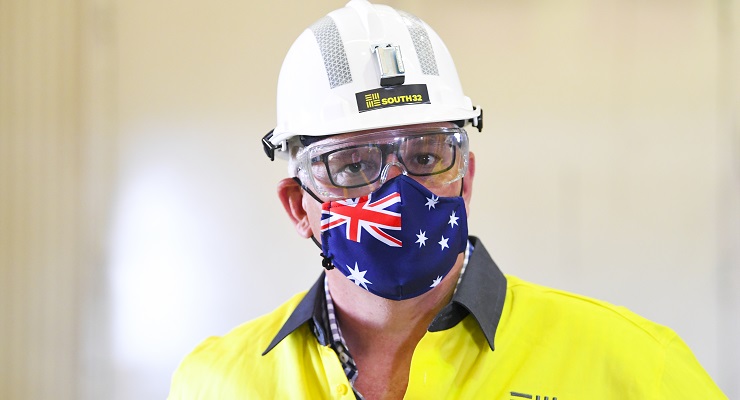
With its pending decision to build a new, wholly unnecessary fossil fuel electricity generation plant in the Hunter Valley, the Morrison government will turn its back on 30 years of economic history and re-embrace a role for the state in power generation — something anathema to the Coalition at state and federal level for decades. In spending — sorry, “investing” — taxpayer money in an emissions-intensive gas-fired plant, the Morrison government will be a modern-dress version of a state government of the 1970s.
Scott Morrison and Angus “insert name of scandal here” Taylor’s threat to intervene in the NSW power market and build their own gas plant may well have scared off private investors who might have invested in new capacity — another chapter in this government’s increasingly long history of deterring private investment. It also illustrates a trend around the world: fossil fuel generation is simply commercially unviable now.
The International Energy Agency — a body closely allied to the interests of global energy companies — demonstrated this in a simple chart last year. Compared to 2015, in 2019 state ownership of energy fell significantly around the world: from 40% to 36% in four years across all sectors, but by proportionately more in renewables where it was already low (18% to 14%), while in more monopoly-prone electricity networks, state ownership fell from 63% to 55% and from 44% to 41% in supply of gas and oil.
But in fossil fuel generation, the role of the state rose: from 43% to 50%. Increasingly, the only people who want to have anything to do with fossil fuel generation are politicians.
Even indirect state ownership is becoming problematic: the right-wing Polish government plans to take coal-fired power plants out of existing state-owned power companies and hold them itself — a kind of decorporatisation — because those state-owned companies struggle to attract lending from fossil fuel-wary investors and financial institutions. Fossil fuel power generation taints anything financially connected to it — an apt metaphor for the deadly pollution coal plants inflict on local communities.
The trend also means it’s taxpayers, not investors, who are on the hook for uncommercial fossil fuel generation investment. And it will be taxpayers who pay for Morrison’s fossil fuel folly in the Hunter Valley — now and in the years ahead, when its non-viability becomes too much of a burden for a future government.








Hardly a surprise. The self proclaimed “superior economic managers”… Let’s have a look at their track record:
They turned a fibre optic investment with an economic life of >100 years save for relatively inexpensive further upgrade potential into a short term upgrade, leaving the weakest part of the network in place as its cornerstone…The exercise ought to have been expensed; it was obsolete before it was complete. ~$100 billion wasted.
They’ve commited Australia to another $100 billion on a submarine program of questionable merit. They would likely gert better value from investing a small fraction of that on cyber capability instead, and rethinking the submarine approach entirely.
So…why would we expect any better vision when it comes to energy strategy? I expect two outcomes: higher consumer gas prices; and a large capital write-off. Blown emissions targets are simply a given.
“Hello World….. Welcome to Scotty’s Assisted Demise Clinic.”
He/they’re turning Australia into a fossil fuel sanctuary – and we tax-payers are paying to keep their donors afloat in profit.
While he’s got us standing on the platform of Economic Progression watching the Renewables Express pass through without stopping…. Maybe he’s waiting for The Rapture to pull in, so he can see who’ll get on, and he’s just trying to speed it up?
Sports Rorts, UCF, FFWSS and all the others combined, don’t come near this for shear scale of perversion of public funds (buoying his Coalition donors’ fortunes) – he takes us all for sheep…
Baa.
… We’ll all be wearing their black raddle mark.
…. Something Scotty picked up in NZ?
The “perversion of public funds” is an excellent description of what this federal government has done every day of its life, klewso, since Tony Abbott took up the mantle of Chief Idiot. There have been a few changes at the top but the government has been steadily regressing since Tony.
Hard to believe Australia has to depend on a creepy individual who believes that unsolicited touching of people is somehow good for them.And we will not even mention that he affirms his belief in an invisible being called the Devil.!This our PM.
Probably thinks oil is only 4000 years old.
That’s actually a serious question for Morrison “How old is the earth?” If the answer is 5000 years, and I suspect it is, he must absolutely go.
He’d be left behind to deal with the mess he’s making of the planet. The dud hasn’t a clue about anything, I’m surprised he knows his own name.
Let’s keep this simple: YES!
There was even a group of ‘Nanna’s turned up at K House, a day or so back, with lead spokesnanna talking into a mic about the economic dangers of “stranded assets”.
Is there some international criminal law we can charge these idiots with. We also need to organise some consequences for the people bribing them. Can we ask Biden to start investigating secret tax haven bank accounts to see what our pollies have got stashed away and follow the paper trails? The corruption is becoming too blatent for words.
Great policy to send in a white elephant as your next attack in the forever culture wars.
If I was so anti-renewables, I’d just change the system so that people who have put solar panels on their roof have to pay gas companies for the privilege of giving them their electricity.
Oh, wait …